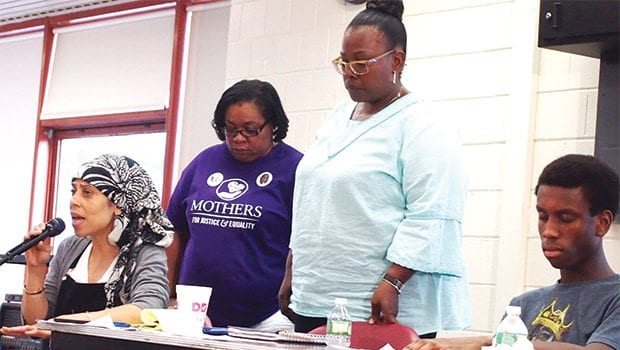Facilities plan seen as part of charter strategy
Hub enrolled in plan for ‘school autonomy’

Back in January when members of the BPS parent group Quality Education for Every Student met with Mayor Martin Walsh, their allegation that the mayor said he planned to close more than 30 schools triggered controversy and a sharp denial.
But in the months that followed, budget cuts and a much-maligned independent study undertaken by McKinsey & Company alleging the city’s 57,000 students are being educated in school buildings that have a capacity of 93,000 have further strained relations between the mayor and BPS parents and students.
The calculation in that study has been widely discredited for reasons that include counting non-classroom space and ignoring student-teacher ratios. The report also contradicts a 2013 analysis undertaken by BPS that found the city’s school buildings had the capacity to accommodate 61,338 students. Yet Walsh repeated the 93,000-seat estimate last Wednesday while live on WGBH’s Boston Public Radio.
“What we’re talking about is privatization of Boston’s schools,” said Najma Nzay’at, lead organizer at the Boston-area Youth Organizing Project, speaking during a community meeting on school funding at Madison Park High School last Thursday. Students at the meeting responded to Nazy’at’s remarks with chants of OTM, an acronym for “one-term mayor.”
Fanning the flames of parent and student discontent are revelations that Boston is participating in an 18-month plan that seems aimed at closing the district’s school buildings and converting them to charter schools, a plan most of the city’s parents and students have never heard of.
During last week’s meeting at Madison Park QUEST member Megan Wolf detailed the city’s participation in the Center for the Reinvention of Public Education’s (CRPE) Portfolio School District program, which outlines the steps districts must take to close schools and transfer them to charter schools.
National movement
Boston is one of 45 participating districts, according to the website of CRPE, a Seattle-based think tank backed by pro-charter funders that include the Walton and Gates foundations. Other districts include Chicago and New Orleans, both of which have undergone massive public school closures and rapid charter expansion.
CRPE’s website makes little reference to charter schools, describing its mission as a means to promote greater school autonomy.
“The portfolio strategy is a problem-solving framework through which education and civic leaders develop a citywide system of high-quality, diverse, autonomous public schools,” the organization’s website reads. The group advocates the use of pilot schools and other strategies to lessen the influence of district central offices in the day-to-day operations of schools.
But an earlier 2014 version of CRPE’s portfolio plan is peppered with suggestions to close district schools and transfer the buildings to charter schools. In month nine, districts are advised to “announce which district-run schools are going to be chartered out.”
Viewed through the lens of CRPE’s portfolio plan, Walsh’s insistence that Boston’s schools are over capacity has stoked parents’ fears of a creeping charter takeover.
“Marty Walsh is on the hot seat now,” Wolf said.
The Walsh administration is considered to be well underway toward creating autonomous schools, with plans to switch to a unified enrollment system. Walsh appears to be using the McKinsey report to justify the closing of district schools.
“We believe we’re following the same path that has led other districts to massive school closures,” Wolf said.
Push back
Beyond school closings, the CRPE playbook advises districts to adopt a menu of reforms, including uniform student and teacher evaluation metrics. As The Boston Globe reported Tuesday, the state’s push to adopt a teacher evaluation system that relies on students’ test scores has met with stiff resistance from teachers unions, school superintendents and school committees. The state Senate last week amended state law so that teacher evaluations will no longer be contingent on the so-called student impact ratings.
While the plan CRPE outlines has specific benchmarks, the organization counsels districts to follow their own timelines. In the CRPE outline, in month eight of the CRPE outline, districts are advised to adopt a unified enrollment plan. Although BPS held several community meetings on unified enrollment last year, reaction from parents ranged from indifferent to hostile.
The quiet push to lay the groundwork for charter expansion in Boston has been eclipsed by this year’s battle over a statewide ballot referendum to lift the state’s cap on charter schools. Charter advocates, backed by the New York-based Families for Excellent Schools, have pledged to spend $18 million to secure passage of the measure. Teachers unions, led by the Massachusetts Teachers Association, have pledged to spend $12 million, making the campaign the most expensive ballot question in Massachusetts history.
Walsh, a former board member of the Neighborhood House Charter School, supports a gradual lifting of the cap on new charter schools, contingent on increased funding for district schools.
But Boston officials aren’t waiting for state funding as the inside effort to expand charters continues to unfold. The city joined the Portfolio program in 2011 – well before Walsh was in office.







